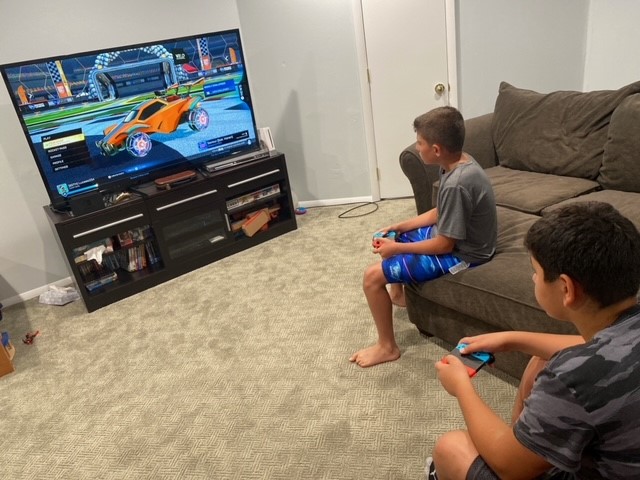Organized video game competitions teach kids teamwork, problem-solving and strategy skills while promoting healthy camaraderie
WHITE LAKE — Video games have come a long way since the 8-bit “Super Mario Bros” of generations past.
Today, esports — a name for competitive video gaming — is a multi-million-dollar industry, with teams from the around the world competing in high-stakes tournaments in arenas packed with fans.
At its highest levels, esports competitors can garner sponsorships, international tournament invitations, endorsement deals and college scholarships — not unlike basketball or football players — to compete in games such as “League of Legends,” “Starcraft” or “Super Smash Bros.”
In Michigan, 13 colleges have varsity esports teams, with many colleges, including Aquinas College, Siena Heights University and Lawrence Tech, offering scholarships. At the high school level, 58 schools have recognized varsity esports clubs, including Catholic schools such as Detroit Catholic Central, Austin Catholic, Our Lady of the Lakes and University of Detroit Jesuit.
Now, the Catholic Youth Organization is getting in on the action.

This year, St. Patrick School in White Lake became the first elementary school in the Archdiocese of Detroit to sponsor an esports teams in a middle school division, offering young students a chance to get into competitive gaming.
“Esports is basically, in essence, electronic sports. It’s a gaming platform many youth today like to play,” said Noor Atisha, coach of the St. Patrick esports team. “Whether it’s Xbox, Nintendo Switch, PlayStation or PC, people from different schools play online in different formats of the game, playing competitively, with schools throughout the country.”
Atisha has a son who plays for Detroit Catholic Central’s team, which sparked Atisha’s own interest in esports, spurring him to start a middle school program at his younger son’s school.
Twenty dedicated St. Patrick students participated in the first year of the program, playing age-appropriate games such as “Mario Kart,” “Super Smash Bros.,” “Rocket League” and “Minesweeper.”
Not every young person is a traditional athlete, and esports offers an environment where young people can showcase their skills with peers while having a good time, Atisha said. Esports athletes compete as a team on their own gaming device — a PC or gaming console — synching with other teams from around the country.
“It gets these children more involved in trying and competing in a team environment, just like any other sports like soccer, basketball or football,” Noor Atisha said. “It teaches these kids discipline, understanding how to play against opponents, but also how to plan a particular game, strategy, teamwork and dedication.”
Esports involves a formalized interface with a set schedule, matches with other schools that begin at a specific time, usually 4 or 7 p.m., and a set number of games in each match.


“We’re the only Catholic (elementary) school that has esports, so we play against public schools and stuff like that,” said Aiden Atisha, Noor’s son and a seventh-grader on the team whose favorite game is Rocket League, a soccer-like video game involving cars. “It’s just fun to play video games with your friends, because you know you are going to have it every week, and it’s just fun.”
At more senior levels, esports competitions are held in arenas with the teams competing side by side. But this year, players played at home, making esports one of the few pandemic-friendly clubs at St. Patrick.
“We had basketball canceled at the last minute at St. Patrick’s, due to a COVID concern,” Noor Atisha said. “We were able to get soccer in, but there was a lot of frustration with the youth being cooped up all year.”
The camaraderie among the inaugural members of the team made for a healthy change of pace in what was a weird school year, said Lucas Stephan, an eighth-grader at St. Patrick.
“We tried as much as we could to stay in-person this school year, which was pretty nice, but esports was one of the only clubs we could actually do,” said Stephan, who plans to play esports next year at University of Detroit Jesuit as a freshman. “So I thought it was cool to be able to do this.”
Stephan said esports teaches students how to overcome obstacles in competition, assisting teammates when they are in trouble, and how to solve problems.
With esports gaining popularity in schools across the country, Noor Atisha expects more schools to join St. Patrick in forming clubs of their own.
“The youth of today are growing into the gaming environment,” Noor Atisha said. “There are a lot more colleges and high schools who are sponsoring esports teams, and they are going to want experienced players in their programs. This is giving students an opportunity to compete in something that is new and growing.”









